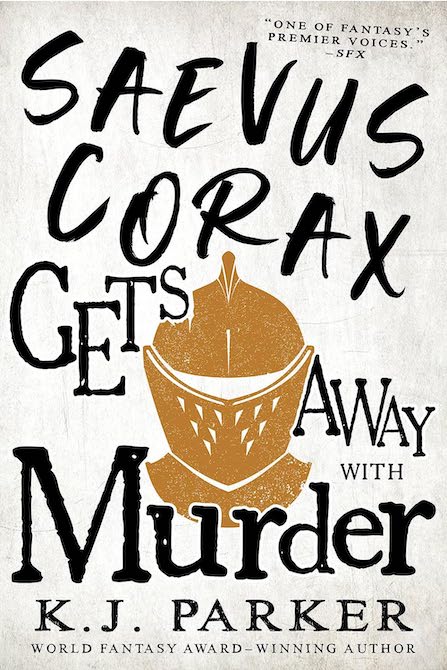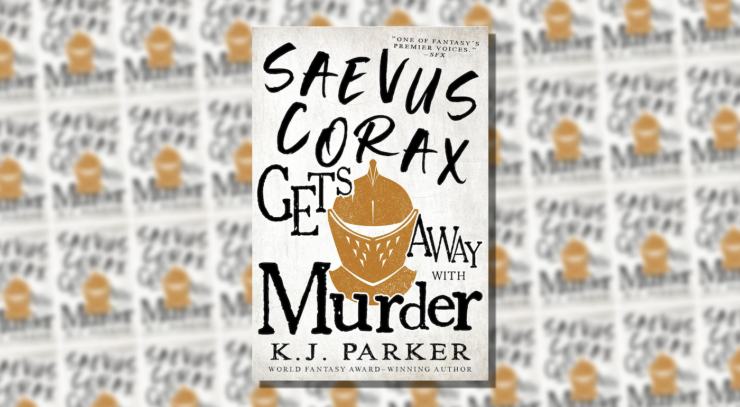K.J. Parker dedicates Saevus Corax Gets Away with Murder “For my friends; Given what’s coming, our only hope is to have no hope at all.” It’s also a warning to the reader: “Getting away” may not mean getting away clean, and anyone looking for a conventionally heroic denouement should look elsewhere. Then again, any one who has read the first two books in Parker’s trilogy, Saevus Corax Deals With the Dead and Saevus Corax Captures the Castle, will have few illusions left.
In the first chapter of the first book, the narrator, a runaway aristocrat turned battlefield salvager, poisons an old acquaintance foolish enough to loudly call him by his birth name. For various motives, generally self-serving but occasionally altruistic, he has bludgeoned, poisoned, stabbed, throttled, and lied. He’s honest with no one but the reader; he even lies to himself. Late in this concluding book, Corax, bound, gagged, and blindfolded, hears his captor warn a lackey that he is “the most dangerous man in the world.” On reflection, Corax thinks that this is likely true, and that it is something to be ashamed of. He wants out of the game, but doesn’t expect he’ll manage his escape.
The first of this book’s two central plots concerns the fate of Corax’s sister Fan, now a duchess. “Estranged” is too gentle a word for their relationship, as Fan has had a bounty on Corax’s head and would like nothing more than to see him suffer a slow death. However, when Fan flees her duchy after murdering her husband, she runs to her hated brother for attention. The second plot line concerns Saevus, his lieutenant Gombryas, and his fellow con-artist Stauracia in search of a vast golden treasure in the tomb of an emperor. This treasure may or may not exist; most agree that it’s a myth. All the action takes place in the shadow of an impending continental war. Although Saevus managed to ward off international conflagrations in earlier volumes, this time around global war seems inevitable. If Saevus Corax wants to survive, he’ll need to be away from the action, preferably with a great deal of money. Once again, he’s on the hunt for “the big score.”
Buy the Book


Saevus Corax Gets Away With Murder
As ever, Corax bounces from predicament to predicament, but few, in this book, matter to anyone other than him. When the great war arrives at last, Corax tumbles in its wake. In Saevus Corax Deals With the Dead, he briefly led an army. When the time comes for him to Get Away With Murder, he finds himself scavenging for food in burnt-out towns. Corax’s story is a corrective to a whole genre of heroic fantasy. Historical forces and cultural pressures have made the violence inevitable; even this most cunning antihero is unable to prevent the war or mitigate its effect.
Saevus Corax Gets Away With Murder hews to the formula that Parker established in his first two books, but he deepens and expands Corax’s character before closing the book on his antihero. Corax’s sister Fan is a loathsome creation, petulant, pampered, cruel, and oblivious, but her claim that she witnessed Corax’s inadvertent killing of their brother forces our narrator to reevaluate his actions. Corax has persuaded himself that his brother’s death while sparring with fencing swords was an accident, but Fan tells him that from her perspective, it was intentional. Is Fan lying to her hated brother? Or has Corax been lying to himself? While he ponders this, Corax has another problem to deal with, namely his love for Stauracia, which he quickly decides is the cruelest of torments: “Love makes things matter, and for that I can never bring myself to forgive it.”
Parker has a reputation for precision-engineered plots; his novellas often end on twists that seem inevitable in retrospect, and the final volume of an earlier trilogy was named The Escapement after a clockwork mechanism. The Corax trilogy is less strenuously plotted, appropriately enough for a series about a man forever scraping up the bloody aftermath of other people’s grand designs. Still, a little more attention to continuity wouldn’t have hurt. For example, early in Gets Away With Murder, Stauracia finally gets her own personal big score when she relieves Fan of some of her jewelry. Why should this make such a difference to her, when Saevus Corax Captures the Castle ended with her gaining an information monopoly that should have made her “the richest woman in the world”? This major development has, apparently, been forgotten.
Saevus ends his tale alive and well but not happy; he concludes his story with the flat assertion that “I have nothing at all left to say.” Over the course of this trilogy, I sometimes grew a little impatient with Parker’s story: The three volumes, released over the course of three months, amount to a thousand pages of Saevus’s wry narration, and I would have appreciated having a breather between the installments. Still, I find myself sorry to have heard the last of Saevus Corax. He was good company. Whatever Parker chooses to write next, I know I’ll be reading.
Saevus Corax Gets Away With Murder is published by Orbit.










